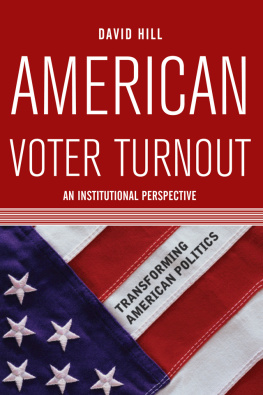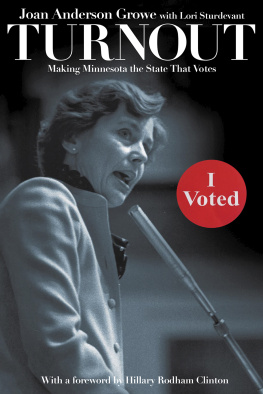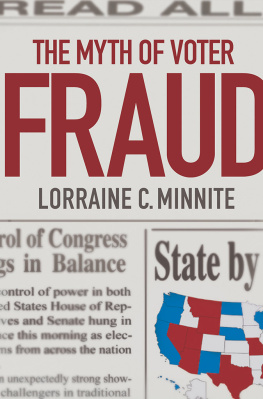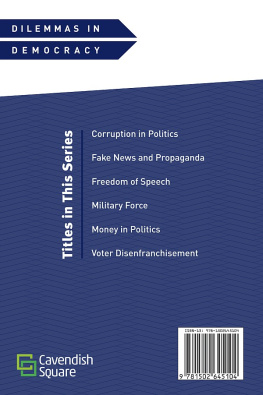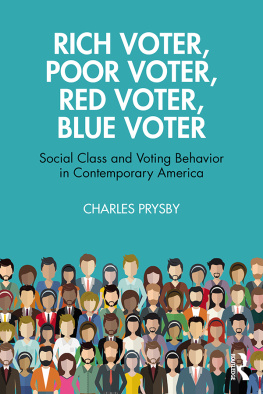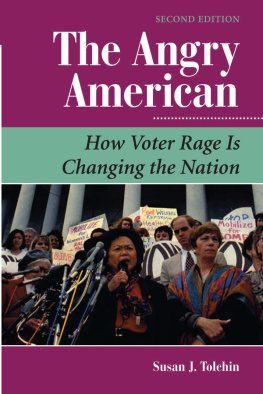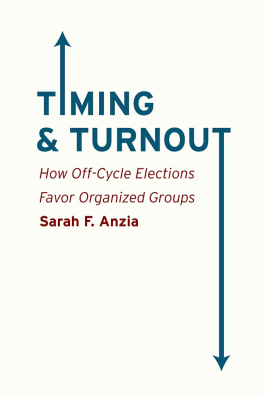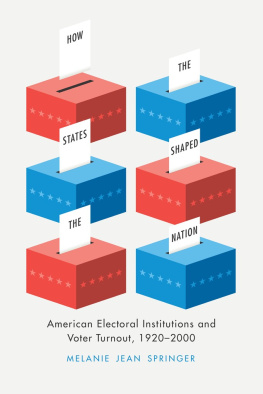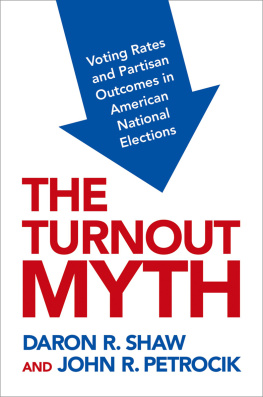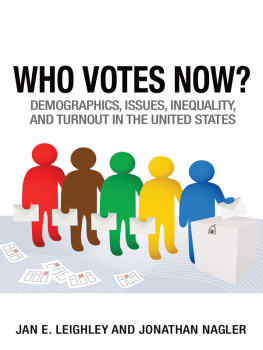American Voter Turnout
Transforming American Politics
Lawrence C . Dodd , Series Editor
Dramatic changes in political institutions and behavior over the past three decades have underscored the dynamic nature of American politics, confronting political scientists with a new and pressing intellectual agenda. The pioneering work of early postwar scholars, while laying a firm empirical foundation for contemporary scholarship, failed to consider how American politics might change or recognize the forces that would make fundamental change inevitable. In reassessing the static interpretations fostered by these classic studies, political scientists are now examining the underlying dynamics that generate transformational change.
Transforming American Politics brings together texts and monographs that address four closely related aspects of change. A first concern is documenting and explaining recent changes in American politicsin institutions, processes, behavior, and policymaking. A second is reinterpreting classic studies and theories to provide a more accurate perspective on postwar politics. The series looks at historical change to identify recurring patterns of political transformation within and across the distinctive eras of American politics. Last and perhaps most important, the series presents new theories and interpretations that explain the dynamic processes at work and thus clarify the direction of contemporary politics. All of the books focus on the central theme of transformation in both the conduct of American politics and in the way we study and understand its many aspects.
BOOKS IN THIS SERIES
American Voter Turnout: An Institutional Perspective, David Hill
Revolving Gridlock, Second Edition, David W. Brady and Craig Volden
The Congressional Experience, Third Edition , David E. Price
Campaigns and Elections American Style, Second Edition, edited by James A. Thurber and Candice J. Nelson
The Parties Respond, Fourth Edition, edited by L. Sandy Maisel
Diverging Parties, Jeffrey M. Stonecash, Mark Brewer, and Mack Mariani
Votes, Money, and the Clinton Impeachment, Irwin Morris
Class and Party in American Politics , Jeffrey M. Stonecash
Congress and the Decline of Public Trust , edited by Joseph Cooper
Public Opinion in America, Second Edition, James A. Stimson
Still Seeing Red, John Kenneth White
Masters of the House , edited by Roger H. Davidson, Susan Webb Hammond, and Raymond W. Smock
Governing Partners , Russell L. Hanson
Governance and the Changing American States, David M. Hedge
The Collapse of the Democratic Presidential Majority, David G. Lawrence
The Divided Democrats, William G. Mayer
Extraordinary Politics, Charles C. Euchner
The Irony of Reform, G. Calvin Mackenzie
Broken Contract, Stephen C. Craig
Young Versus Old, Susan A. MacManus
The New American Politics, Bryan D. Jones
Bureaucratic Dynamics, B. Dan Wood and Richard W. Waterman
The Dynamics of American Politics, Lawrence C. Dodd and Calvin Jillson
The Politics of Interests, Mark P. Petracca
First published 2006 by Westview Press
Published 2018 by Routledge
711 Third Avenue, New York, NY 10017, USA
2 Park Square, Milton Park, Abingdon, Oxon OX14 4RN
Routledge is an imprint of the Taylor & Francis Group, an informa business
Copyright 2006 by Taylor & Francis
All rights reserved. No part of this book may be reprinted or reproduced or utilised in any form or by any electronic, mechanical, or other means, now known or hereafter invented, including photocopying and recording, or in any information storage or retrieval system, without permission in writing from the publishers.
Notice:
Product or corporate names may be trademarks or registered trademarks, and are used only for identification and explanation without intent to infringe.
Library of Congress Cataloging-in-Publication Data
Hill, David.
American voter turnout: an institutional approach / David Hill.
p. cm.
Includes bibliographical references and index.
ISBN-13: 978-0-8133-4328-0 (hc: alk. paper)
ISBN-10: 0-8133-4328-3 (hc: alk. paper) 1. VotingUnited States.
2. Political participationUnited States. 3. ElectionsUnited States.
I. Title.
JK1967.H545 2006
324.973dc22
2005022689
ISBN 13: 978-0-8133-4328-0 (pbk)
Introduction
At approximately 2:00 P.M. on November 3, 2004, John Kerry conceded the 2004 presidential election to President George W. Bush, thus ending a close, often bitterly fought campaign. By all accounts 2004 should have been a high-turnout election . It took place in the context of a controversial war and a controversial issue (gay marriage) that had the potential to mobilize voters on both sides of the issue. Additionally, both Republican and Democratic parties, along with their allied interest groups, waged extensive and intense drives to register as many new voters as possible (Into the Final Straight 2004), and they spent more money than ever before on a presidential election (www.opensecrets.org).
A record number of voters cast ballots on Election Day (123,675,639), the highest turnout for a presidential election since 1972, with the exception of 1992. The turnout rate for all individuals of voting age (VAP) was 55.3 percent, a five percentage point increase over 2000. The turnout rate for all citizens, excluding individuals ineligible to vote due to citizenship status or incarceration (VEP), was 60 percent in 2004, an almost six percentage point increase over 2000.
Nonetheless, the turnout rate was a disappointment when compared with those in nineteen other industrialized democracies, including Great Britain, France, Germany, Italy, and the Scandinavian nations. These democracies have had an average 72.6 percent turnout in their most recent elections, as contrasted with 60 percent for the United States in 2004.points lower, even in a highly competitive national election with a great deal at stake. Nor is the higher turnout in recent elections among the other democracies a recent aberration.

Mean Turnout in Established Democracies, 19602000
Source: International Institute for Electoral Assistance;
Federal Elections Commission
It highlights a crucial question about the nature of American democracy: Why is voter turnout in the United States so much lower than in other industrialized democracies, even in situations that seem primed to induce voter participation?
In this book, building on the extant research relating to national-level turnout, I argue that the turnout in U.S. national elections is comparatively low mainly because the electoral, representational, and governmental institutional arrangements in the United States create an environment that constrains rather than facilitates electoral participation. The core of the book will bring to undergraduate students and interested laypersons a systematic understanding of how American institutions have inhibited voter turnout when democratic institutions elsewhere seem more prone to facilitate it. My concern specifically is with why America lags behind other countries in voter turnout, not with the rise or decline in turnout across time among industrialized democracies. Since this issue can be confusing, I shall address it at the beginning of this book.



